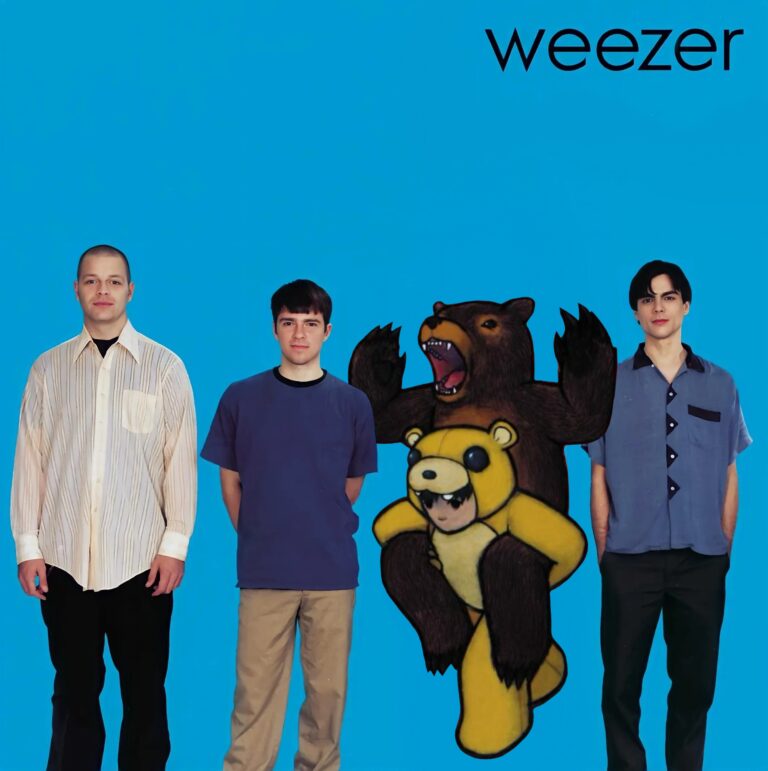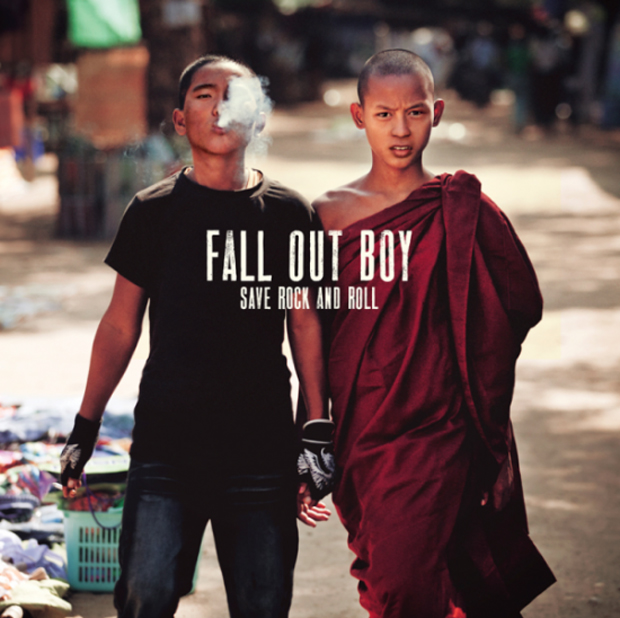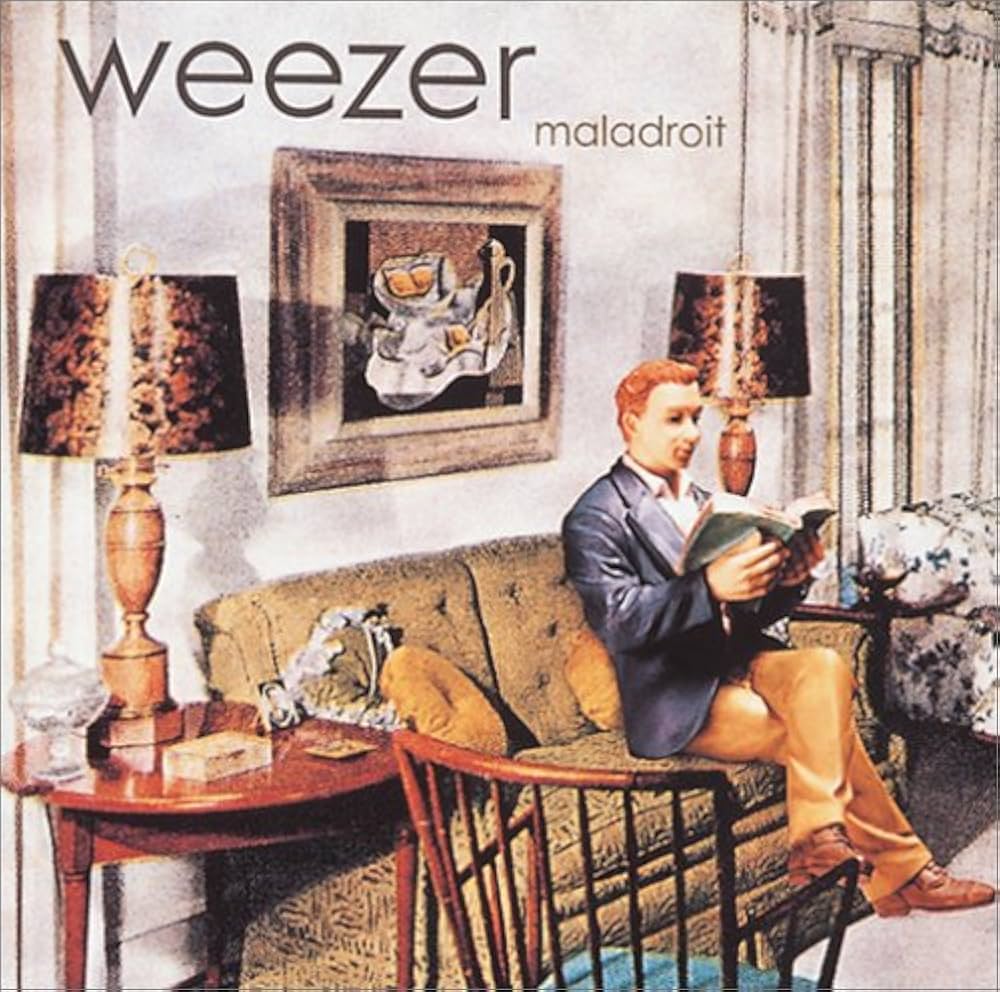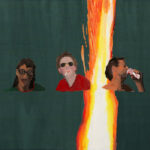As excited as I was to return to GW this year, a new Instagram post from infamous rock group Weezer almost had me jumping back in the car and driving four hours back to New York. The band’s street team had picked a wall in Bushwick, Brooklyn, and covered it in the shade of blue any fan of mid-90’s rock music knows and loves. I had missed the “Weezer Wall” by literally 24 hours, and I knew I wouldn’t make it back until it had been vandalized beyond recognition.
There are very few bands that are loved enough to have fans braving the J train to take pictures of the side of a warehouse. There are even fewer bands that are ridiculed with an equal amount of passion, causing ashamed listeners to scribble out their name on their yearly “Spotify Wrapped” posts. For any other group, having your name be almost synonymous with virginity and incel culture would be a death sentence.
Controversy surrounding Weezer’s place in rock music hit its peak in the early 2000’s, so I experienced the beef vicariously through my dad’s reflections on the pioneers of “Nerd Rock.” For me, this wasn’t a very hard conflict to visualize. I was picking up where he left off, albeit in a much smaller, much more angsty corner of the internet.
Anyone who had anything go wrong for them in middle school knows what the “emo trinity” is. If things were going REALLY wrong, you might even know about the “emo quartet” and the constant arguments in online spaces about which bands deserved a spot. Groups like Panic! At the Disco, My Chemical Romance, and Twenty One Pilots were all in the running, but there was one band that seemed to be in a more extreme limbo. At the time I discovered them, Fall Out Boy was riding the high of their 2015 chart-topper, American Beauty/American Psycho. Hits like “Uma Thurman” and “Irresistible” were being played daily on the radio, “Immortals” was a highlight of the movie Big Hero 6, and you could hear clips of “Centuries” playing in the background of every NFL game. Were they finally bringing the emo genre to the forefront of the music industry, or had they sold out and gone pop? I had extremely strong opinions on this in seventh grade, as did all of my Hot Topic-loving friends. I believed Fall Out Boy had built the foundation for every emo band to come, while others insisted they didn’t even belong in the genre in the first place.
Looking back on both of these bands, the similarities between their history, reception, and comebacks are undeniable, even culminating in the “Hella Mega Tour,” the concert series both groups did with pop punk gods Green Day. So how are both of these bands still selling out Madison Square Garden? It seems that if decades of public criticism doesn’t (permanently) break up the band, it only makes them stronger.
The undeniable peak for Weezer was their self-titled debut, now known as the Blue Album. The internet will never be free of the “Buddy Holly” riff, the “Undone (Sweater Song)” drum intro, or the addictive hook of “Say it Ain’t So.” There are so many clippable parts of the album that it’s easy to forget what a masterpiece it is as a whole. Hearing the drums and strings kick in during the opener, “My Name is Jonas” is still a top ten moment in 90’s rock for me. After re-listening to it for this article, I will stand by the fact that the Blue Album has absolutely no skips.
Everyone who mattered in the music industry at the turn of the century thought so too. The Blue Album first received rave reviews from college radio stations, and steadily continued gaining popularity. They released music videos for “Undone (Sweater Song)” and “Buddy Holly,” both of which became staples on MTV and went on to win Billboard music awards. By 1995, fans had fully realized what they were missing out on, and the Blue album went triple-platinum that same year. The Rolling Stones magazine put “Buddy Holly” in their top 500 guitar songs of all time, alongside the likes of Jimi Hendrix and Van Halen. They also made it into Pitchfork’s top ten tracks of the 90’s, joining the pile of music critics that were throwing themselves at the feet of four awkward guys that had stumbled into stardom.
Less than a decade later, Fall Out Boy was experiencing an even longer (but less acknowledged) streak of hits. Led by already prominent scene queen Pete Wentz, the lineup of musicians rooted in the Chicago hardcore community leaned into the age of the internet and pop-culture mania to release three unbelievably impactful albums. Take This To Your Grave exploded in the emo scene with fast paced singles like “Grand Theft Autumn (Where is Your Boy?),” selling almost 300,000 records independently before the band was signed to Island Records. Their debut album had lit the fuse, and there was no stopping Fall Out Boy as they took radio stations and billboard charts by storm with their new album, From Under the Cork Tree. Songs like “Our Lawyer Made us Change the Name of This Song so We Wouldn’t get Sued” and “I Slept With Someone in Fall Out Boy and All I Got was This Stupid Song Written About me” proved to the public that they were aware they didn’t necessarily fit in with the other boy bands blowing up at the time, and that they were able to make fun of themselves and keep surprising the music world. Other hits like “Sugar, We’re Going Down” and “Dance, Dance” are staples on pop punk playlists to this day.
Fans loved the quirks of the eclectic group of musicians, and Fall Out Boy embraced this in their third album, Infinity on High. Patrick Stump shed the standard pop-punk accent in favor of a soul-influenced sound that was unique within the emo scene. Why does Infinity on High open with a short monologue by Jay-Z? I couldn’t tell you, but it was clearly the right move because the album debuted at number one on the Billboard U.S. charts. Iconic songs like “Thnks Fr Th Mmrs” and “This Ain’t a Scene, it’s an Arms Race” were added to the laundry list of Fall Out Boy tracks that are now considered emo classics. The industry loved Fall Out Boy, and the internet loved them even more. Like Weezer before them, it seemed that there was no stopping their skyward trajectory.
What goes up must come down, though, something both bands had to reckon with at the height of their success. In 1996, Weezer came out with their follow up to the Blue Album, Pinkerton. To say the reception was bad would be an understatement. The readers polled for the Rolling Stone magazine gleefully declared Pinkerton the third worst album of 1996. Nu-metal was creeping up the charts and MTV turned towards bands with a clean, mean, “I dont give a fuck” attitude. Because of this, Pinkerton’s raw production and lyrical sincerity fell out of favor at an astonishing speed. Is it fair to laugh at the haters during this time period? They were craving a continuation of the high quality production, consistent sound, and pop buffers dotting the Blue Album. Can you blame them for turning up their noses at the muddy guitars and vaguely problematic lyrics of Pinkerton? I say YES. I find it hard to believe a fanbase that was fresh off the grunge hysteria of the 90’s couldn’t handle a crunchy sounding amp and some slightly cringey lyrics. Unfortunately, the general public’s intolerance for Pinkerton ended up clouding frontman Rivers Cuomo’s own perception of the album, with him going so far as to call it “diseased” and a “hideous record.” The fans had turned on Weezer, so the band was forced to write off their second album as an untimely mistake as they tried to win back the music world.
Fall Out Boy faced a similar wave of hatred upon the release of their fourth studio album, Folie à Deux. The album included features from other prominent figures in the scene at the time such as Brendon Urie of Panic! At The Disco and William Becket from The Academy Is… Additionally, Pete Wentz had just begun a relationship with model and singer Ashlee Simpson, making him a favorite of tabloids and TMZ. All the circumstances surrounding the album promised another chart-topper, and yet the immediate response to Folie A Deux was nothing short of revulsion. The initial Rolling Stone review claimed the album suggested “A band with an advanced case of ADD,” and other critics wrote the album off as an experimental flop. Public insult began sparking turmoil within the band as they started getting booed at their own concerts. In a now-hilarious coincidence, Fall Out Boy even got booed off stage in 2008 when filling in for none other than Weezer, during their joint tour with Blink-182. Whispers of tensions within the band, specifically between singer Patrick Stump and frontman Pete Wentz, began taking over the internet. These rumors came to fruition after Wentz announced Fall Out Boys indefinite hiatus in November of 2009, citing burnout and the world needing “A little less Pete Wentz.” In both of these instances, the masses beat out the cult followings of each band that stayed loyal through their respective public beatdowns. The future of both Fall Out Boy and Weezer became uncertain, threatening the end of the “loser rock” movement before it had even truly begun.
Weezer charged into the 21st century with a comeback in the form of another self titled album known as the Green Album. 2001 marked the end of their four year hiatus, and the album debuted at #4 with powerhouse singles like “Hash Pipe” and “Island in the Sun.” Though the Green Album’s reception was more mixed than the Blue Album, many music critics celebrated Weezer’s return to the pop-based sound they were looking for, laying on praise as penance for the brutality of the Pinkerton reviews. As the Green Album gained popularity, it looked like the industry had won in the end. Weezer was staying true to their original form, and restoring their reputation with every cowboy chord and pop chorus they played.
Almost a decade later, Fall Out Boy was once again following in Weezer’s footsteps. Save Rock and Roll was released 24 hours after an interview where Pete Wentz swore up and down that Fall Out Boy was gone forever. The album resulted in a wave of approval from OG fans who were happy to see them back together, and an onslaught of new younger fans who were thrilled to have at least one member of the “Emo Trinity” active during their teenage years. At the time of Save Rock and Roll’s release in 2013, Panic! At The Disco had become Brendon Urie’s disappointing solo act, and My Chemical Romance had announced their breakup less than a month before. Needless to say, middle schoolers everywhere were ecstatic that a band from the MySpace/scene kid era that they had missed was cranking out emo anthems once again. Fall Out Boy was also clearly appealing to the music industry, with both Save Rock and Roll and their follow-up album American Beauty/American Psycho full of pop-rock hits that were made for radio. The only thing reassuring pre-hiatus fans that they hadn’t sold out completely were the few slightly heavier songs on each album. Rapid drums and fast guitars briefly popped up in songs like “Novocaine” and “The Mighty Fall,” the latter of which includes a rap feature from Big Sean. Both of these were middle-of-the-album tracks that are still rarely given their flowers, but they suggested that Fall Out Boy hadn’t forgotten their hardcore, experimental roots.
Weezer had taken a turn towards the hardcore sound as well with their fourth album, Maladroit. The album has a sound that literally never popped up in Weezer’s discography again, shocking fans and music critics alike. This album made it clear that now that Weezer was back, they were going to do whatever they wanted. Maladroit was followed by a whopping 11 more albums. Highlights from Weezer’s comeback discography includes their iconic cover of “Africa” by Toto, their Van Halen parody album (fittingly called Van Weezer), and their collaboration with famously hated band AJR. In short, Weezer was out of fucks to give, and so were their fans. The people that kept listening past their 2021 album OK Human (which involved exclusively analog instruments and a 38-piece orchestra) were sticking around till the very end, and filling stadiums tour after tour. Even though they were experimenting with every genre under the sun, Weezer made it clear they never forgot where it all started. They are currently touring for The Blue Albums 30th anniversary, playing the Blue Album front to back and sprinkling in many favorites from Pinkerton. The tour as a whole is a nod of appreciation for everyone who put up with the hate of the public, the music industry, and the self-loathing that almost drove Rivers Cuomo to swear off playing Pinkerton ever again. With retirement on the horizon for Weezer, there is no doubt that their revolutionary, expansive, and completely bizarre mark on rock and roll will be remembered forever.
As I’m sure you could guess, Fall Out Boy took Weezer’s lead, and completely confused critics and fans everywhere with their seventh studio album, MANIA. The rock hits that were played everywhere from NFL games to Victoria’s Secret fashion shows were nowhere to be found, replaced by trippy, electronic voice effects and stripped back, psychedelic guitar. Their first single from MANIA, “Young and Menace”, was a headache-inducing EDM song that even I was completely unprepared for. MANIA was not popular among fans or critics. OG fans wanted the hardcore sound of Take This To your Grave, and newer fans were expecting the inoffensive pop Fall Out Boy had been feeding them since their comeback. The negative reaction to MANIA triggered a hiatus even longer than their first one following Folie A Deux. Just when fans had accepted the quiet end of Fall Out Boy, “Love From the Other Side” was released in January of 2023 after cryptic messaging from the once-completely-defunct FOB social media. “Love from The Other Side” was an unprecedented back-to-rock track, echoing the pre-hiatus songs and causing an uproar from alternative magazines, music critics, and most of all, fans. Their subsequent album, So Much For Stardust includes guitar heavy songs with energetic drums and ear-wormy bass riffs, but also utilizes a full orchestra and grand piano on many of the more ballad-y songs. The album acted as both a confident return to the alternative scene, and a firm reminder that Fall Out Boy could not be simplified to fit into any one genre.
Weezer and Fall Out Boy have mastered the recipe for musical longevity. Both bands have weathered insane ups and downs throughout their careers, all while managing to stay hilariously true to themselves. Each has embraced every hiccup and high note they’ve experienced, proving that sticking around long enough to spark (occasionally heated) conversation with your music is a victory in itself. If you couldn’t tell already, I am a die hard fan of both, and think the central takeaway from Weezer and Fall out Boy’s parallel histories is that if you can’t be perfect, at least be memorable. And if nothing else, keep rocking out, no matter how many times you might trip on stage.







